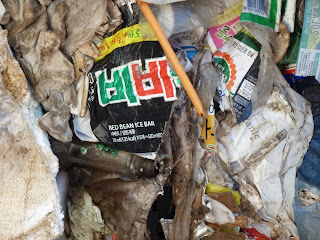Climate Action and Justice Groups Vow to Block "Waste-to-Energy" Incinerators
Quezon City. Climate action and justice groups vowed to throw out incinerator schemes masquerading as "renewable energy" sources as these are undermining the country's ban on waste incineration, while causing toxic pollution and reduced employment in the recycling sector.
In a campaign launch held yesterday (April 17), the groups, led by the EcoWaste Coalition and the Global Alliance for Incinerator Alternatives (GAIA), lamented the influx of “waste-to-energy” or WTE schemes, which cover a broad range of technologies that directly generate energy from burning waste.
Other campaign participants include the Ang Nars, Bangon Kalikasan Movement, Cavite Green Coalition, Focus on the Global South, Freedom from Debt Coalition, Greenpeace Southeast Asia, Health Care Without Harm, Krusada sa Kalikasan, Institute for the Development of Educational and Ecological Alternatives, Mother Earth Foundation, Sanib Lakas ng mga Aktibong Lingkod ng Inang Kalikasan and Zero Waste Philippines.
WTE incineration schemes include a wide range of burn technologies, including gasification, plasma, pyrolysis and mass burn incinerators, some of which, according to the groups, have already secured clearances and permits to operate.
"It is anomalous that incinerator pushers are using the climate issue as an additional platform to peddle their polluting technologies. Worse, our government agencies and officials are falling for this ruse at great expense to the health of communities and the environment," said Manny Calonzo, Co-Coordinator, GAIA.
"The Philippines does not need incinerators as there are safer and more practical waste management options available that can best serve the goals of the country in mitigating climate change, in protecting the environment, and in generating green jobs and enterprises," said Roy Alvarez, President, EcoWaste Coalition.
According to the book "False Solutions to Climate Change," the incineration industry has rebranded itself and is selling new types of expensive incinerators with fancy names, which often create more greenhouse gases and toxic byproducts than traditional incinerators.
From a climate standpoint, waste prevention is the most practial carbon emissions reduction scheme complemented by reusing, recycling and composting, the groups said, while landfilling and incinerating waste are deemed the worse options.
From the perspective of resource conservation, phasing out residual waste (the waste that remains after reusing, recycling or composting) is the best means to ensure all discards are reusable, recyclable or compostable, the groups stated.
Waste separation, reusing, recycling and composting,, the groups pointed out, generate far more jobs and safer working conditions than landfilling and incinerating waste.
The groups also scored using landfill gas-to-energy projects to justify and perpetuate the practice of mixed waste landfilling to supposedly curb the production of methane, a greenhouse gas 72 times more potent than carbon dioxide over a 20-year period.
Keeping compostable organics out of landfills helps avoid methane releases far more successfully than burning landfill gas for energy, the groups asserted.
In lieu of WTE, the groups are calling for investments in waste prevention and reduction, source separation, extended producer responsibility, informal recycling sector and other initiatives that will lead to a progressive reduction of the volume and toxicity of waste sent for disposal.
The Clean Air Act of 1999 bans the incineration of municipal, biomedical and hazardous wastes, which process emits toxic and poisonous fumes, while the Ecological Solid Waste Management Act of 2000 requires the adoption of best environmental practices in ecological waste management excluding incineration.
-end-
Reference:
http://www.risingtidenorthamerica.org/wordpress/2010/07/06/hoodwinked-in-the-hothouse-false-solutions-to-climate-change-available-now/




Comments